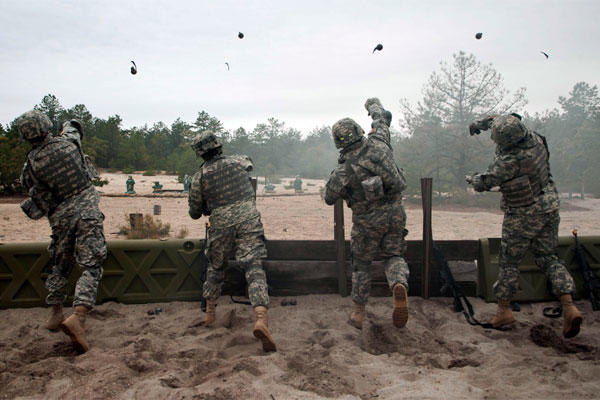Pentagon leaders would have to again slash funding for annual training across the military unless Capitol Hill blocks budget cuts mandated by the Budget Control Act, which is scheduled to be enforced in fiscal year 2016.
Units across the service had to cancel annual field exercises and cut down on flight hours in fiscal year 2013 when the Pentagon last faced the full brunt of sequestration's across-the-board cuts. Defense Department Comptroller Mike McCord said Wednesday that commanders will have to make the same plans unless the cuts are blocked.
The Pentagon will include an analysis of these training cuts in a document military leaders are preparing for Congress to detail the impact of sequestration upon the Defense Department. The military is holding out hope it will again receive a partial reprieve as it did in 2014 and 2015.
Along with training, McCord reiterated that sequestration will also delay the reset of service equipment returning from Afghanistan and reduce the amount the military can invest in acquisition, research and development projects, McCord said.
"There are a lot of possibilities and a part of my job is to be ready for them. I think it is going to be sometime before we have real clarity on this," he said.
McCord said last years' "sequester impact" document did not have much of an effect because of a successful Congressional deal struck to avert sequestration and restore funding for 2015.
"Everybody knew there was no need to focus on sequester impacts in '15 because there was not going to be one. We will in all likelihood submit a similar document this time with a similar level of detail. It may engender more discussion this year because sequester is a real possibility this year as opposed to last year," he explained.
Once the sequester impact document is finished, McCord said the plan is to show it to newly appointed Defense Secretary Ashton Carter for approval – before sending it over to Capitol Hill for lawmakers to review.
In submitting the fiscal year 2016 defense budget request, the Defense Department and White House chose not to include sequestration cuts in what was seen as political move to encourage Congress to again spare the military. Despite the prospect that sequestration will return in 2016, the Pentagon does not plan to prepare an alternative 2016 defense budget to the one submitted earlier this month.
"We have not prepared an alternative budget. We discussed and rejected that idea many months ago. It is an enormous workload for our people to prepare at the level of detail that a budget entails. We believe in the budget we submitted. We think that it makes a lot of good decisions. If Congress doesn't support it we may be forced to negotiate and come up with alternatives," he said.
Defense Department leaders have repeatedly said the restrictions in choosing what programs receive the brunt of the cuts can cause the most harm. However, the Pentagon did find ways in 2013 to partially protect big ticket weapons programs like the F-35 Joint Strike Fighter.
McCord spent time with reporters on Wednesday trying to highlight the cuts that would likely cause the most harm, especially considering the conflicts in Ukraine and the Islamic State in Iraq and Syria (ISIS).
The Army has said the service would have to cut its number of soldiers from 450,000 to 420,000 should sequestration cuts be enacted.
Navy leaders have said the service would be forced to retire an aircraft carrier and bring the services' overall number of carriers from 11 down to 10, massively impacting the Navy's ability to forward deploy and project power in parts of the world.
As for the Marine Corps and expeditionary warfare, Navy leaders say sequestration will greatly worsen an already difficult situation regarding the service's need for amphibious assault ships.
McCord stressed that planners need to anticipate the prospect of sequestration for both one year and multiple years, explaining that the impact in each of those scenarios would be quite different.
A multi-year sequestration impact, for example, could massively hinder or complicate the Air Force's plans to acquire F-35 aircraft or build its new Long Range Strike Bomber slated to replace the B-2. Sequestration would also affect the Air Force's plans to acquire its new KC-46A tanker aircraft.
-- Kris Osborn can be reached at kris.osborn@military.com





























